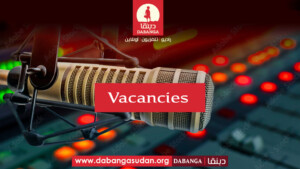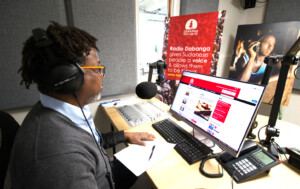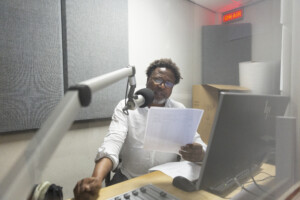Makers of Dabanga: The story of Klaas van Dijken
Klaas van Dijken is a renowned freelance journalist from the Netherlands who has reported from within Sudan’s conflict areas. In the series Makers of Dabanga, we ask him how Radio Dabanga became an indispensable element during his travels to Darfur.
 Displaced people hiding in caves in western Jebel Marra in February 2016 (RD)
Displaced people hiding in caves in western Jebel Marra in February 2016 (RD)

Klaas van Dijken is a renowned freelance journalist from the Netherlands who has reported from within Sudan's conflict areas. In the series Makers of Dabanga, we ask him how Radio Dabanga became an indispensable element during his travels to Darfur.
Klaas is one of the only European journalists to have travelled to Darfur in at least seven years, aiding Radio Dabanga in reporting on vital humanitarian issues that affect Sudanese people.
“The sun hadn’t yet risen when we arrived at the cave after two and a half hours of climbing. For a moment we were able to catch our breath. Surrounding us were the Jebel Marra mountains, based in the center of the war-torn Sudanese region, Darfur. Inside the cave hundreds of women and children, and a few elderly men, were taking shelter. They made campfires to boil water for tea. A child cried, a woman went outside to relieve herself. The people were taking refuge in the cave from aerial bombardments that shook the ground nearly every day; aerial bombardments fired under the command of Sudanese president Omar Al Bashir.”
As many as three million people have been displaced by the counter-insurgency while half a million have been killed…
“It is now 15 years since the world first learned of the brutal campaign in Sudan which pitted government forces and the notorious Arab militia, known as the Janjaweed, against rebel forces drawn from African ethnic groups such as the Fur, Zaghawa and Masalit. As many as three million people have been displaced by the counter-insurgency while half a million have been killed. The accounts of human rights abuses in Darfur saw Al Bashir indicted by the International Criminal Court. By now 29 years in the presidential seat, Al Bashir’s efforts to prevent aid workers, the UN, and journalists from accessing large parts of Darfur has seen the conflict disappear from headlines, even as the violence has continued.
The sheltering caves of Jebel Marra
“The people sheltering in this cave tell me stories of Darfur. In the conflict the Sudanese Armed Forces and pro-government militias ethnically targeted civilians, forcing them to flee and survive in caves, cut off from any aid services. [English link] [Link to Dutch radio]
“We arrived early in the morning. People slowly started to wake up and speak softly to each other. A radio was turned on somewhere in the cave and the signature jingle of a program echoed through the cave. I recognized the tune, as it is the same tune that we had heard every day on our journey into Darfur.
“As I write this, the opening jingle of Radio Dabanga plays in my head and I vividly see the cave that morning in my mind’s eye.
They listened to Radio Dabanga intently, conscious and aware of its position as the only independent news broadcaster that works without interference from the Sudanese government…
“Just outside the cave, a number of people huddled around the radio – I later learned it was the only radio the displaced people had that was working. They listened to Radio Dabanga intently, conscious and aware of its position as the only independent news broadcaster that works without interference from the Sudanese government.
“Displaced people knew where others had been attacked by the air force or militias because of the news broadcasts of Radio Dabanga. Day by day, they learned why there was fighting in their home areas, where fighting had moved to, and how others had fled. They were told of camps for internally displaced people (IDPs) and discovered the situation in the overcrowded camps. The news reader of Radio Dabanga also told them about the economic situation in the country.

Food shortage
“Nationwide cuts on basic goods and food shortages meant that people in Jebel Marra would face an even tougher challenge to secure food for themselves.
“After all, these people were cut off from any aid services. No international or national aid organization had set foot in the Jebel Marra mountains for years. Even the peacekeeping forces of the UN and the African Union, called UNAMID, were blocked access by the Sudanese government. In other cases, they did not have the mandate, or courage, to move to areas where people faced conflict and medicine or food shortages.
“Radio Dabanga had become their only lifeline to the outside world. Not once, but twice a day, the radio station informed them with independent news. I heard that most people in the cave also listened to the repeated broadcasts in the early evening before going to sleep. People literall rise and go to bed with Radio Dabanga.”
You can find out more about Klaas' work on his website or follow him on Twitter.
Support Radio Dabanga in giving a voice to the people in Sudan. Share Klaas' story online, or sponsor two minutes, half an hour or a day of shortwave airtime for Radio Dabanga on GoGetFunding. Help keep these radio programs on air!












 and then
and then